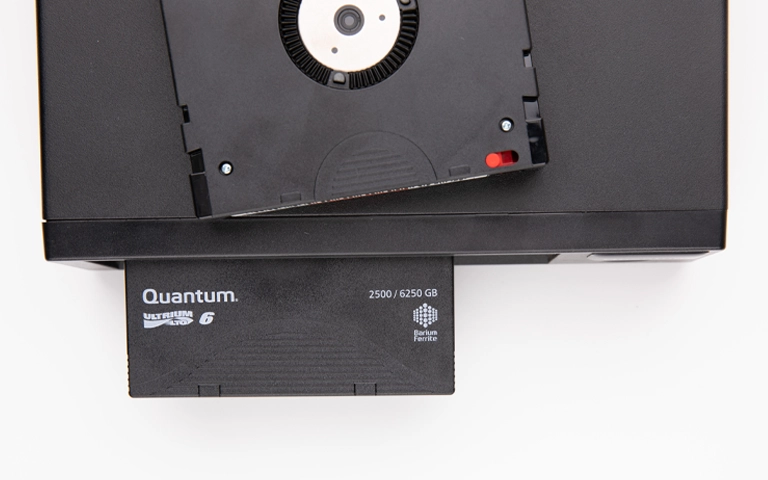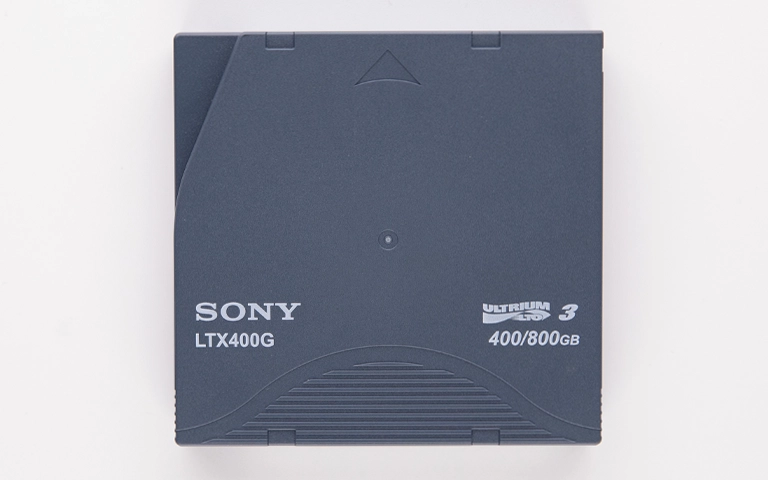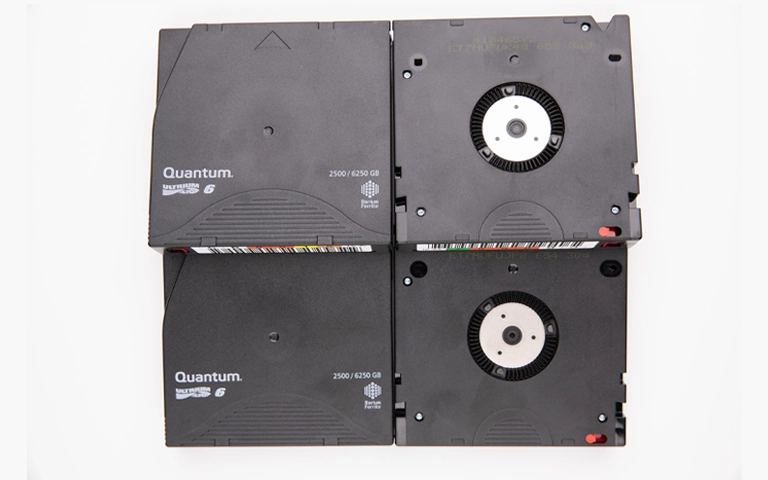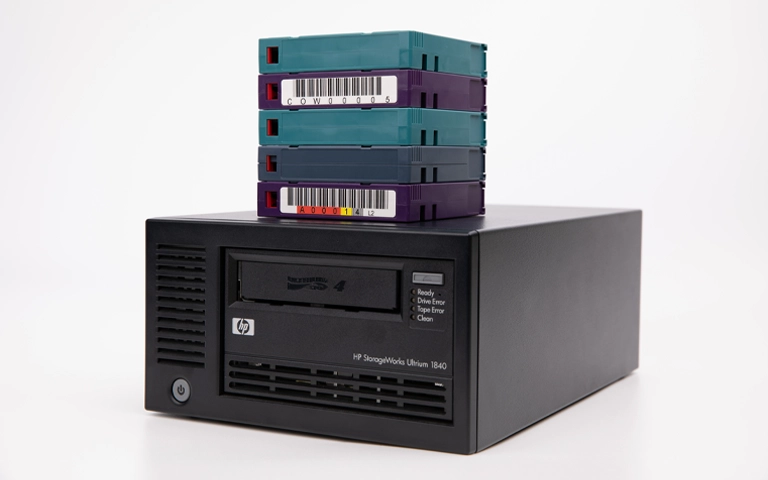In an era dominated by cloud technology and SSDs, it’s easy to assume that tape drives belong to the past. Yet, walk into any enterprise data center or government archive, and you’ll still find rows of tapes quietly preserving terabytes of critical data.
So why are these decades-old devices still in use today? From massive data backups to long-term archival storage, tape drives continue to serve as an essential tool for organizations that value reliability above everything else.
Let’s explore where they are used and why their importance in modern data management continues to grow.

What Is a Tape Drive and Why Does It Matter Today?
Tape drives have been around for decades, but they still play a vital role in secure data storage and backup strategies. A tape drive uses magnetic tape to record and retrieve information, offering a reliable and cost-effective method for archiving large volumes of data.
Even with the rise of cloud and disk-based storage, many organizations continue to rely on tape drives for long-term data retention. They provide unmatched stability, allowing businesses to preserve critical records for years without worrying about constant maintenance or energy costs.
In this article, you’ll learn how tape drives work, where they are most commonly used, and why they remain a trusted choice for large-scale data protection.
How Tape Drives Work
Tape drives use magnetic tape to store data in a linear sequence. Instead of random access like in hard drives, tape drives write and read data in order, making them ideal for large, continuous backups and long-term archiving.
The storage medium, often housed in cartridges, moves across read/write heads that record data magnetically. This sequential design allows the drive to store massive amounts of information with minimal power usage.
Modern systems, such as LTO tape drive technology, combine this proven method with high-capacity cartridges and fast transfer speeds.
As a result, tape storage remains a cost-effective and energy-efficient solution for enterprise environments.

Common Applications of Tape Drives in Businesses
Despite their age, tape drives continue to play a major role in enterprise data protection strategies. Their ability to handle large volumes of data securely makes them valuable in several key areas:
Data Centers: Tape drives are often part of large-scale backup infrastructures, ensuring critical information can be restored after failures or cyber incidents.
Archival Systems: Legal, healthcare, and research organizations use tapes to store data that must be kept for many years without alteration.
Disaster Recovery: Tape drives provide a secure offline backup option that protects against ransomware and system corruption.
Enterprise Backup Rotation: Businesses use tape libraries to manage routine backups efficiently while minimizing storage costs.
In many organizations, tape backup for business remains one of the most dependable methods for safeguarding sensitive data.
They also complement server and cloud backup environments, offering redundancy and long-term preservation.
Industries That Rely on Tape Storage
While many modern businesses have shifted toward digital and cloud-based systems, several industries continue to rely heavily on tape storage for data preservation and compliance.
These organizations depend on stability and long retention periods that magnetic tape easily provides.
Government Agencies: Use tape drives to store classified information and maintain regulatory archives.
Financial Institutions: Keep transaction logs, client records, and audit trails safely stored offline for years.
Research and Education: Universities and laboratories archive large datasets, experimental results, and historical data.
Healthcare Providers: Retain patient files and imaging data for long-term recordkeeping and legal compliance.
Enterprises: Integrate tape drives with enterprise storage systems to balance performance, capacity, and cost.
Each of these sectors values reliability over speed, which is why tape remains a trusted method for long-term data archiving.

Why Businesses Still Trust Tape Drives
Tape drives continue to earn trust because they offer practical advantages that other storage technologies cannot fully replace. Their design focuses on endurance, affordability, and offline safety, which makes them ideal for long-term protection of valuable information.
Key benefits include:
High Capacity: Modern tape cartridges can hold multiple terabytes, allowing large data sets to be stored efficiently.
Longevity: Properly maintained tapes can retain data for decades without degradation.
Energy Efficiency: Tapes consume no power while stored, reducing operational costs for data centers.
Offline Security: Since tapes are not connected to the network, they remain safe from cyberattacks. This makes them valuable for protection against ransomware attacks.
These strengths explain why tape drives continue to be part of modern hybrid backup systems, combining durability with low ownership costs.
Fast turnaround times for business-critical data
Challenges of Tape Storage
While tape drives offer many advantages, they also come with certain challenges that limit their use in some environments. One of the main drawbacks is access speed. Because tapes store data sequentially, retrieving specific files can take longer compared to disk-based systems.
Another concern is physical degradation. Over time, tapes can wear out or become damaged if not stored under proper conditions. Environmental factors such as humidity, temperature, and magnetic interference can also affect their readability.
Additionally, managing large tape libraries can be complex and time-consuming. Regular maintenance, labeling, and tracking are required to avoid data loss.
In some cases, businesses turn to experts for cartridge-based data recovery solutions to restore critical files from aging or unreadable tapes.

When to Contact Tape Data Recovery Experts
Despite careful handling, tape drives can still fail due to physical damage, aging, or improper storage. When this happens, attempting to access or repair the tapes without the right tools can make the problem worse and permanently destroy the data.
Professional engineers use specialized equipment to recover information from damaged or unreadable tapes. They can restore data from broken cartridges, stretched tape, or overwritten sections safely and accurately.
If your organization faces tape corruption or cartridge failure, it is best to rely on tape drive recovery services.
At RAID Recovery Services, we handle all types of tape media and complex storage systems, ensuring your archived data is recovered securely and efficiently.
Trust the experts with proven results
Frequently Asked Questions
What is the main purpose of a tape drive?
A tape drive is designed for long-term data storage and backup. It uses magnetic tape to archive large volumes of information securely and cost-effectively, making it ideal for organizations that need reliable, offline data protection.
Why are tape drives still used today?
Tape drives remain in use because they offer unmatched data retention, low cost per terabyte, and offline protection from cyberattacks. Many enterprises rely on them as part of their hybrid backup strategies to ensure secure, long-term preservation.
Which industries benefit most from tape storage?
Government, finance, healthcare, and research institutions commonly use tape storage. These sectors depend on long-term data retention, compliance, and secure offline backups.
What are the common causes of tape drive failure?
Failures often occur due to worn-out tape media, poor storage conditions, magnetic damage, or physical cartridge wear. Mechanical issues within the drive can also prevent tapes from reading or writing data properly.
Can data be recovered from a damaged tape drive?
Yes. Professional recovery engineers can extract information from corrupted, physically damaged, or aged tapes using specialized tools. RAID Recovery Services provides secure recovery solutions for all types of tape media and storage systems.